Successfully removed a 700g bladder stone from a man in Dak Lak
Information from the Central Highlands General Hospital said that this hospital has just performed surgery and successfully removed a 700g stone from a male patient with bladder tumor. The patient is Mr. YKE (45 years old, residing in Krong Ana district, Dak Lak).
Previously, this person was admitted to the Central Highlands General Hospital in a state of lower abdominal pain, body weakness, fatigue, paleness, and blood in the urine.
Through examination, doctors discovered that the patient had a tumor in the bladder, accompanied by a very large stone. Surgery was needed to remove the stone and the tumor.
Doctor Nguyen Ngoc Hoang, Head of the Department of Nephrology and Urology, said that the patient had blood in his urine and kidney failure, so he had to receive multiple units of blood before surgery could be performed.
A large stone in the bladder stuck to the tumor, pressing on the ureteral orifice causing hydronephrosis in both kidneys.
The surgery was quite difficult because the stones were stuck to the tumor, forcing the bladder tumor to be removed and the obstruction of the two ureteral openings to clear the urine.
"After nearly 2 hours of surgery, we removed a bladder stone weighing 700g. In more than 20 years of experience, this is the first time I have seen a bladder stone of such a large size in a patient," Dr. Hoang shared.
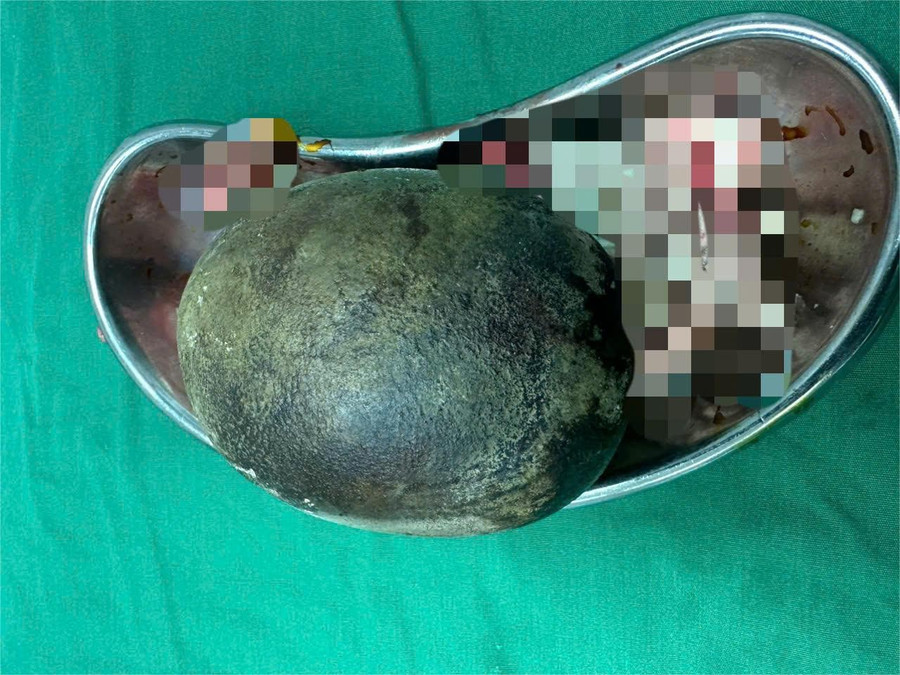
Stone in patient's bladder. Photo: Hospital
What are bladder stones?
Bladder stones are hard mineral deposits that form in the bladder. Bladder stones usually occur when you don't empty your bladder completely; the urine clumps together and forms mineral crystals called stones.
Causes of bladder stones
Cystocele: In women, the bladder wall can weaken and drop into the vagina, which can block urine flow and form bladder stones;
Enlarged prostate: In men, when the prostate gland enlarges, it blocks the flow of urine and causes urine to back up in the bladder;
Neurogenic bladder syndrome: Nerves send signals from your brain to your bladder muscles. If they are injured or damaged by certain diseases, your bladder will not work properly and bladder stones may develop;
Inflammation: When cystitis occurs, stones may form;
Medical devices: Medical devices placed in the bladder such as catheters and contraceptive devices can also cause stone formation;
Kidney stones: Kidney stones are small in size and can pass down to the bladder through the ureter and become bladder stones if not removed.
Symptoms of bladder stones
Small bladder stones can fall out spontaneously during urination without causing any problems. As the stones grow larger, the patient may experience symptoms such as:
Lower abdominal pain: When bladder stones form and roll back and forth in the bladder, the patient will feel dull or severe lower abdominal pain;
Penile pain or discomfort in men;
Difficulty urinating, painful urination or interrupted urine flow: This is a phenomenon of blocked urine stream accompanied by symptoms of burning pain in the genitals. This condition often increases when the patient walks or exercises a lot and decreases when resting;
Frequent urination: The presence of stones in the bladder can cause urinary tract obstruction, thereby causing urinary incontinence and frequent urination during the day;
Blood in the urine or dark urine: This is a kidney infection that causes cloudy urine. When urinating, small bladder stones can come out and rub against the urinary tract, causing bleeding, which in turn causes blood in the urine.
Who is at risk for bladder stones?
- Bladder stones occur mainly in men;
- Bladder stones tend to occur in people 50 years of age and older;
- People with diseases: prostate enlargement, prostate fibroids, prostate cancer, urethral stricture due to infection or surgery that blocks the bladder outlet;
- People with sequelae of stroke, spinal cord injury, Parkinson's disease, herniated disc, diabetes,...
How dangerous are bladder stones?
When bladder stones are large, they cause cystitis.
Bladder infection due to stones is a common complication because large stones damage the bladder lining. When contracting, the stones rub repeatedly against the lining, causing inflammation, ulcers, infections, and even bleeding;
Acute cystitis, if not treated promptly, will lead to chronic inflammation, which can cause bladder atrophy or bladder leakage due to constantly changing urine volume.
Bladder stones can also cause very dangerous complications such as nephritis due to upstream infection and kidney failure. These complications cause many difficulties in treatment, greatly affect the economy , and even endanger life;
Complications of bladder, perineum or vaginal fistula (women), causing urine to leak through the vagina or anus, causing many inconveniences in daily life and causing infection;
In some cases, large bladder stones can cause complete urinary retention, causing urine to stagnate in the bladder, causing the bladder to swell, creating a "bladder bridge" above the pubic bone.
Bladder stone prevention
To reduce the risk of bladder stones, note:
Drink plenty of water: You should drink 2-3 liters of water every day to help your body eliminate toxins and waste from the kidneys and bladder, thereby avoiding the formation of stones.
Add low-fat foods: Foods such as fruits, vegetables, whole grains, low-fat or non-fat milk should be added to the daily menu. In addition, fried foods should be limited, and processed foods and canned foods should not be used.
People with high uric acid in the blood should limit protein-rich foods: Protein can cause uric acid to accumulate in the blood, forming urate salt crystals and accumulating in the bladder. Then, the patient will have a high risk of stones. Each day, you should only supplement a maximum of 200g of meat, prioritizing lean meat, chicken breast and limiting seafood, shrimp, crab.
Supplement foods rich in fiber: Foods containing abundant fiber that should be supplemented daily are vegetables, fruits, whole grains, beans, etc. Men should supplement about 30 - 38g/day and women should supplement 21 - 25g/day.
Avoid stimulants: Limit the use of beer, alcohol, tobacco and other stimulants. Because these chemicals accumulate in the body and easily form stones.
Doctors at the Central Highlands General Hospital also warn that bladder stones left untreated for a long time can lead to complications such as kidney failure and bladder cancer, which are very dangerous and can affect life. When there are signs of stones in the urinary system, patients should quickly go for examination and early treatment.
 Rare bladder stone weighs 1.5kg
Rare bladder stone weighs 1.5kgSource: https://giadinh.suckhoedoisong.vn/nguoi-dan-ong-45-tuoi-mang-vien-soi-nang-700g-o-bang-quang-nguyen-nhan-gay-benh-rat-nhieu-nguoi-viet-hay-mac-phai-172241001195928082.htm








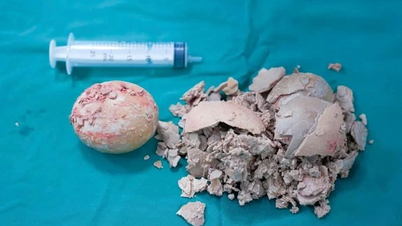



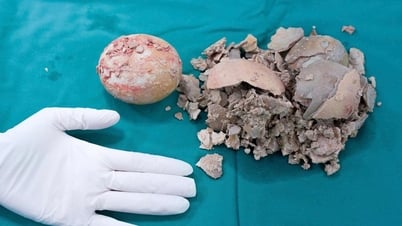

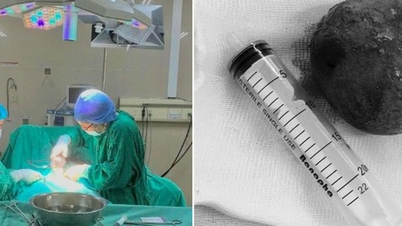


















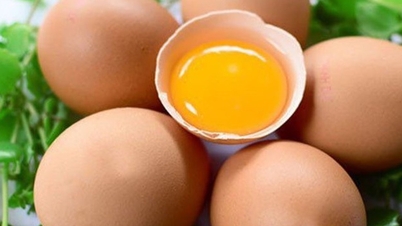











































































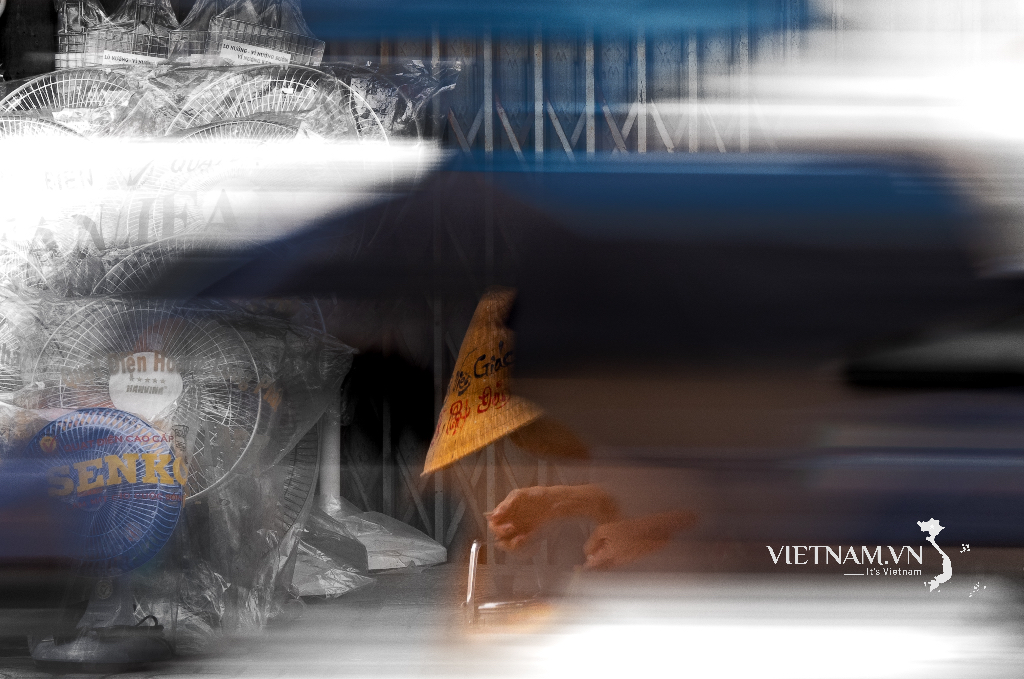




Comment (0)